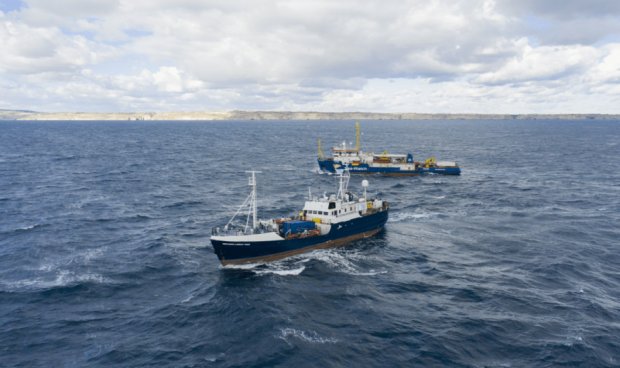Eight EU States Take Migrants Stranded on NGO Boats
People stuck on two NGO vessels for almost three weeks off the Maltese coast are being disembarked onto the island-nation before being sent to eight other EU states.
The announcement on Wednesday (9 January) ends an almost three week stand-off among reluctant EU capitals unwilling to swiftly come to the aid of 49 people, including a one year-old child, confined to the Sea-Watch 3 and the Sea Eye charity boats.
"Let us be frank: the past weeks have not been Europe's finest hour," EU migration commissioner Dimistris Avrampolous told reporters in Brussels.
Amnesty International, in a statement, described the three-week stand-off as "shameful", accusing Italy and Malta of using people on the boats as pawns to negotiate migration policies.
"Their callous disregard for peoples' safety has been bolstered by European leaders' inhumane failure to assist these people promptly," said Elisa De Pieri, Amnesty's researcher on southern Europe.
The 49 will now be sent to France, Germany, Ireland, Italy, Luxembourg, the Netherlands, Portugal and Romania.
Italy - whose ports remain shut to NGO vessels, under an order imposed by its far-right deputy prime minister Matteo Salvini - says it will accept women and children only from the boats, despite Salvini's objections.
Several mayors in Italy had also revolted against Salvini's ultimatum on ports and promised to provide a safe harbor to the German-run vessels.
Such moves were praised by the Sea Watch, which in a tweet said that the Italian ports in Palermo and elsewhere, along with shipping associations, had offered practical solutions to the stand-off long before the European commission.
"After 19 days at sea, our guests finally have a safe haven. It is a testament to state failure, politics must never be made at the expense of people in need," said Sea Watch, in a tweet.
The two are among three NGO ships that still conduct rescues out at sea, down from a peak of 16 in 2015.
At a press conference, also on Wednesday, Malta's prime minister Joseph Muscat said they had no legal responsibility or authority over the two vessels, given the rescues took place near Libya.
Malta's navy had itself rescued 249 people last week, which were then brought ashore. Some of those, including nationals from Bangladesh, are likely set to be returned to their home countries.
"This means that out of the 249 migrants that landed in Malta in the past days, 224 persons will be relocated to another member state, or be returned to their country of origin," said Muscat.
Despite Wednesday's announcement, the slow pace of finding a solution of the two vessels has only further exposed the underlying tensions at the core of the political crisis on migration in Europe.
That issue centres around the equitable distribution of refugees and asylum seekers throughout Europe in a tricky balance between what EU officials describe as solidarity and responsibility.
The balance has so far evaded all EU presidencies tasked with finding a solution as the commission now floats vague proposals on "temporary arrangements" as a stop-gap measure to avoid the same ad-hoc solutions surrounding Sea-Watch and Sea Eye.
Meanwhile, efforts to stem the flow of irregular crossings appears to have worked, given that the number of annual arrivals has dropped to levels not seen since 2013.
Some of those solutions are controversial and involve training the Libyan coastguard, which includes people linked to militia outfits, to carry out rescues only to send them back to notorious detention centres where they face being sold off as slaves or worse.
(Source: EU Observer)













